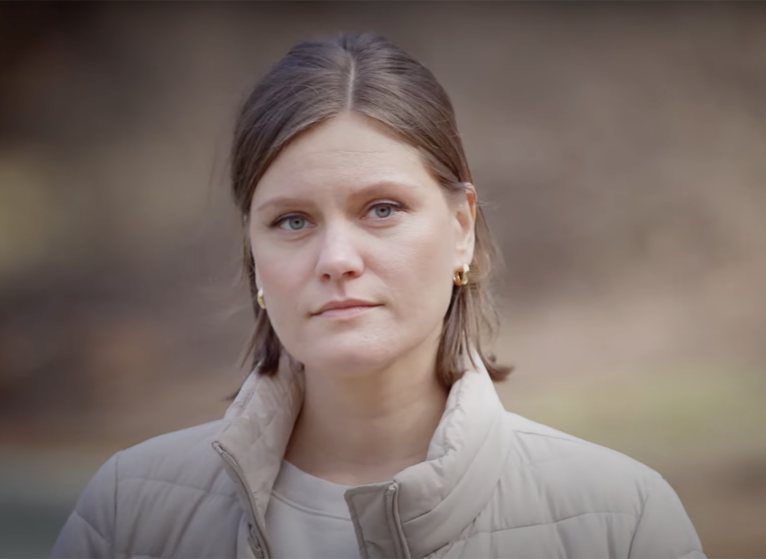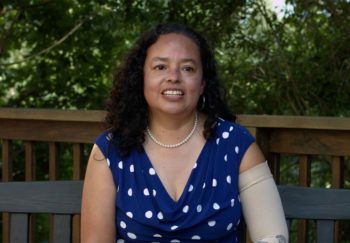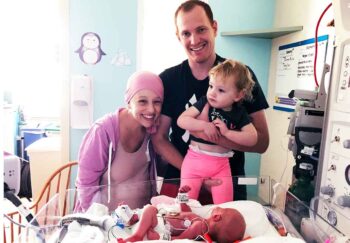How do you survive the shock and challenge of cancer treatment when you’re just 35? Newly married, new to town, young and healthy — Justine was not expecting to get cancer. In fact, when she got called back after her first mammogram , she wasn’t worried. She put off getting her second scan for 6 months.
The results of that second scan completely shocked Justine. Suddenly, she had to worry about the ordeal of breast cancer treatment.
Facing Breast Cancer?
The right support makes all the difference.
Alison Hall, RN, a breast cancer nurse coordinator, played an important role in supporting Justine through chemo. Here, we share:
- 3 keys to getting through breast cancer treatment
- Allison's personal account of support Justine through the challenges of chemo
- A video of Justine's story
The 3 Keys to Making It Through Breast Cancer Treatment: The Right Support Makes All the Difference
Learn everything you can. Patient education resources sound dry and boring. But learning about your disease can give you a better grip on what you’re going through. It can help you feel more in control to understand why and how cancer treatment works.
Lean on others for support. Justine was new in town. She didn’t have family or friends to turn to. But at UVA Cancer Center, the nurse coordinator filled in this gap. They touched base in person and in-between appointments. Justine also got connected to the available psychologists. Getting through something like cancer requires a lot of energy and strength. You can help yourself by letting others help you.
Listen to your body. Justine’s nurse helped her track her side effects. Chemo can cause a range of symptoms, from pain and nausea to hair loss and swelling. Paying attention to how these issues improved or worsened helped Justine communicate when she needed more support. At UVA Health, we have several programs for all kinds of side effects, including massage. This also gave her a chance to really practice self-care.
How a Nurse Care Coordinator Made All the Difference
I see patients with both early and late-stage breast cancer.
I met Justine, early in her trajectory for breast cancer treatment. She had recently had surgery. She was coming to us learning that she would be recommended to complete chemotherapy. I think this was a surprise to Justine. And as for many of my patients, this is weighty news. News that they need to process. It can come with lots of emotional responses.
Justine and I spent a lot of time problem solving barriers in her journey. We came up with lots of solutions, including patient education and ongoing touching base. We used a platform where she was able to rate her side effects on a day-to-day basis.
New Breast Cancer Diagnosis?
Let's navigate this together.
So, as a nurse care coordinator, one of my roles is to help facilitate connections to support services. In Justine's situation, I was able to connect her with our psychology services, to start a flourishing relationship.
With each chemotherapy session, Justine and I would get a face-to-face moment where we could talk about her side effect burden. In between her visits, we would often connect by phone or electronic messaging to keep up to date with how she was doing.
Justine was eager to approach this situation and challenge wholeheartedly. She recognized within herself that there were some challenges that that she had, both internal and external, along with treatment. She was eager to prioritize her care and get back to being her best self.
-Allison Hall, Cancer Care Nurse Coordinator
Justine’s Story: One Woman’s Story of Being Young With Breast Cancer
In this video, Justine talks about her battle with an aggressive cancer.
JUSTINE BECKHAM: My name is Justine Beckham. I'm a realtor in Charlottesville, Virginia, and I'm a breast cancer survivor. I am from Europe. Lithuania. I came over to the States in 2012. I always considered myself healthy. I had a routine checkup with my ObGyn at UVA. She and her resident found the lump in my breast. They called me the day after the biopsy and told me I had cancer. I was blindsided. I was 35. I thought it had to be a mistake.
CHRISTIANA BRENIN, MD: Justine had early-stage breast cancer. It was an aggressive, rapidly growing, proliferating cancer. So it was a very good thing that it was picked up when it was picked up.
JUSTINE BECKHAM: Based on my diagnosis and the mass, I had a choice to make, whether I wanted to just remove the lump, what's called a lumpectomy, or remove the entire breast, or remove both of my breasts. I decided to proceed with a lumpectomy.
CHRISTIANA BRENIN, MD: For Justine, we actually were able to personalize her care, and we got a test called Oncotype Testing, which was a test that told us what is the risk of her cancer coming back in the next 9 to 10 years, how much benefit chemotherapy might give her, and it was very personalized to her individual cancer. And based on that data and those statistics, we were able to together, pretty much, come to the decision that chemotherapy is the right approach for her.
JUSTINE BECKHAM: Doctor Christiana Brenin was amazing. Every step of the way I was explained what is happening, why it's happening. I was always given choices. I was very involved in my treatment. It was really, really hard. I, I just, I thought, I'm not going to make it through, but I was in excellent care. Great doctors, great nurses. And I pulled through. I finished my treatment by end of June, and we signed up for a 5K race for Thanksgiving, and we ran together and I was really slow, but we finished the whole thing, and Jordan was by my side the whole time.
TAMARA FISHER, RN, BSN, CBCN: Justine is a very strong, very humble, very determined and persistent young woman, and now she's standing for many others and persistent young woman, and now she's standing for many others that will come after her and that are even in this journey right now that will gain strength from where she was and where she is now.


